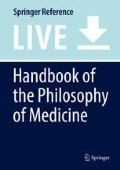Abstract
The notorious World Health Organization definition of health as “a state of complete physical, mental and social well-being and not merely the absence of disease or infirmity” has been roundly, and justifiably, criticized by philosophers more or less since it first appeared in 1948. Despite its obvious conceptual, and practical, limitations, it launched a highly productive debate about the nature of health in which two major strategies have dominated: a descriptive or naturalistic approach in which health is operationally defined in terms of normal functioning understood entirely in the language of the biological sciences and a normative approach which insists that health cannot be understood until the salient fact that health is a human good is explained. This debate has revealed a dilemma: any philosophically acceptable definition of health must make a place for our powerful intuitions that health is both intrinsically and instrumentally valuable. Yet, unless the notion is firmly grounded in the biological sciences and susceptible to operationalization, it threatens to lose its scientific legitimacy. WHO has more recently and with far less fanfare, developed another definition of health “for measurement purposes” that recognizes the force of the dilemma and attempts, with debatable success, to address it.
References
Ananth M (2008) In defense of an evolutionary concept of health nature, norms, and human biology. Ashgate, Aldershot
Beauchamp T, Childress J (2001) Principles of biomedical ethics, 5th edn. Oxford University Press, New York
Bechtel W (1985) In defense of a naturalistic concept of health. In: Humber J, Almedereds R (eds) Biomedical ethics review. Humana Press, Clifton, pp 131–170
Bergner M (1985) Measurement of health status. Med Care 23:696–703
Bircher J, Kuruvill S (2014) Defining health by addressing individual, social, and environmental determinants: new opportunities for health care and public health. J Public Health Policy 35:363–386
Boorse C (1975) On the distinction between disease and illness. Philos Public Aff 5:49–68
Boorse C (1976) Wright on functions. Philos Rev 85:70–86
Boorse C (1977) Health as a theoretical concept. Philos Sci 44:542–573
Breslow L (2006) Health measurement in the third era of health. Am J Public Health 96:17–19
Callahan D (1973) The WHO definition of ‘health’. Stud Hastings Cent 1:77–87
Caplan A (1993) The concepts of health, illness, and disease. In: Bynum W, Porter R (eds) Companion encyclopedia of the history of medicine, vol I. Routledge, London, pp 233–248
Daniels N (2008) Just health: meeting health needs fairly. Cambridge University Press, New York
Engelhardt HT (1984) Clinical problems and the concept of disease. In: Nordenfelt L, Ingemar B, Lindahl B (eds) Health, disease, and causal explanations in medicine. Reidel Publishing Company, Dordrecht, pp 27–41
Goldsmith S (1972) The status of health status indicators. Health Serv Rep 87:212–220
Huber M, Knottnerus J, Green L, van der Horst H, Jadad A et al (2011) How should we define health? BMJ 343:d4163. doi:10.1136/bmj.d4163
Kickbusch I (2003) The contribution of the World Health Organization to a new public health and health promotion. Am J Public Health 93:383–388
Kovács J (1998) The concept of health and disease. Med Health Care Philos 1:33–48
Mann J, Gostin L, Gruskin S, Brennan T, Lazzarini Z, Fineberg H (1994) Health and human rights. Health Hum Rights 1:6–23
McDowell I (2006) Measuring health: a guide to rating scales and questionnaires, 3rd edn. Oxford University Press, New York
Nordenfelt L (1987) On the nature of health. An action-theoretic approach. Reidel Publishing Company, Dordrecht
Nordenfelt L (1993) Quality of life, health and happiness. Averbury, Aldershot
Salomon J, Mathers C, Chatterji S, Sadana R, Üstün TB et al (2003) Quantifying individual levels of health: definitions, concepts, and measurement issues. In: Murray CJL, Evans CJL (eds) Health systems performance assessment debates, methods and empiricism. World Health Organization, Geneva, pp 301–318
Schramme T (2007) A qualified defence of a naturalist theory of health. Med Health Care Philos 10:11–17
Sen A (1999) Development as freedom. Oxford University Press, Oxford
Sigerist HE (1941) Medicine and human welfare. Yale University Press, New Haven
Varga S (2011) Defining mental disorder. Exploring the ‘natural function’ approach. Philos Ethics Humanit Med 6:1
Venkatapuram S (2011) Health justice. Polity Press, Cambridge
WHO (1948) Constitution. World Health Organization, Geneva
WHO (2000) The world health report 2000: health systems: improving performance. World Health Organization, Geneva
WHO (2001) International classification of functioning, disability and health. World Health Organization, Geneva
Wylie C (1970) The definition and measurement of health and disease. Public Health Rep 85:100–104
Author information
Authors and Affiliations
Corresponding author
Editor information
Editors and Affiliations
Rights and permissions
Copyright information
© 2015 Springer Science+Business Media Dordrecht
About this entry
Cite this entry
Bickenbach, J. (2015). WHO’s Definition of Health: Philosophical Analysis. In: Schramme, T., Edwards, S. (eds) Handbook of the Philosophy of Medicine. Springer, Dordrecht. https://doi.org/10.1007/978-94-017-8706-2_48-1
Download citation
DOI: https://doi.org/10.1007/978-94-017-8706-2_48-1
Received:
Accepted:
Published:
Publisher Name: Springer, Dordrecht
Online ISBN: 978-94-017-8706-2
eBook Packages: Springer Reference Religion and PhilosophyReference Module Humanities and Social SciencesReference Module Humanities

